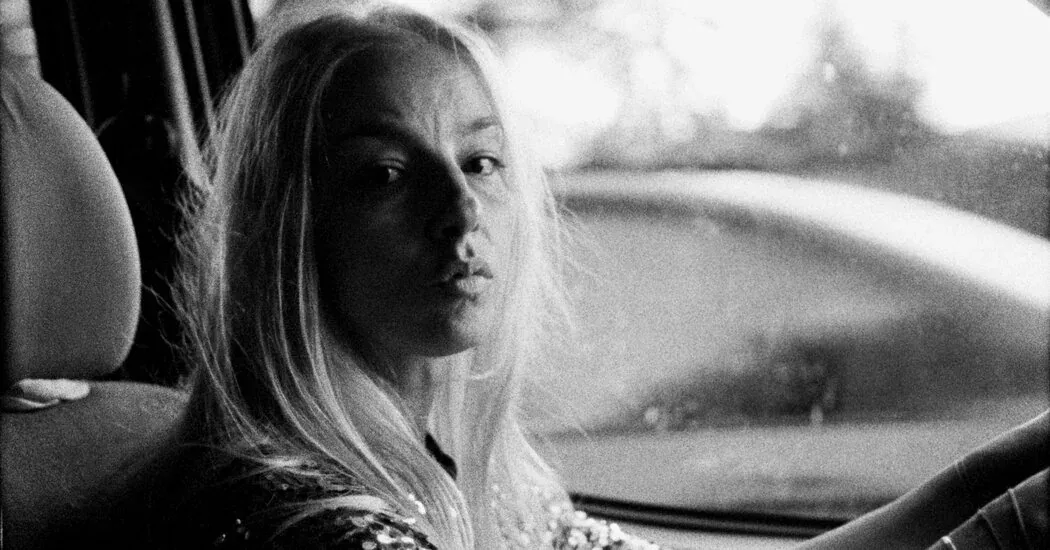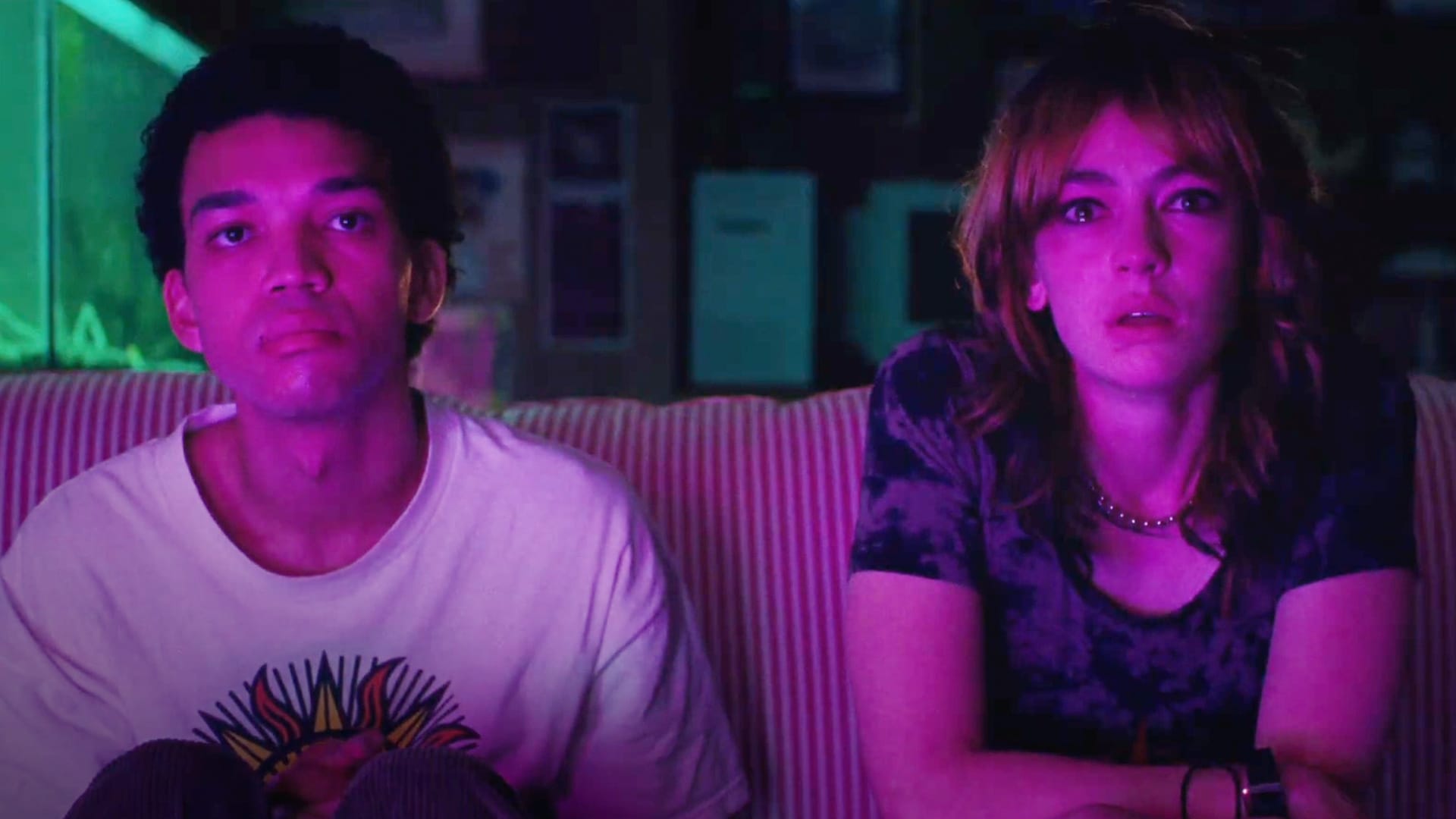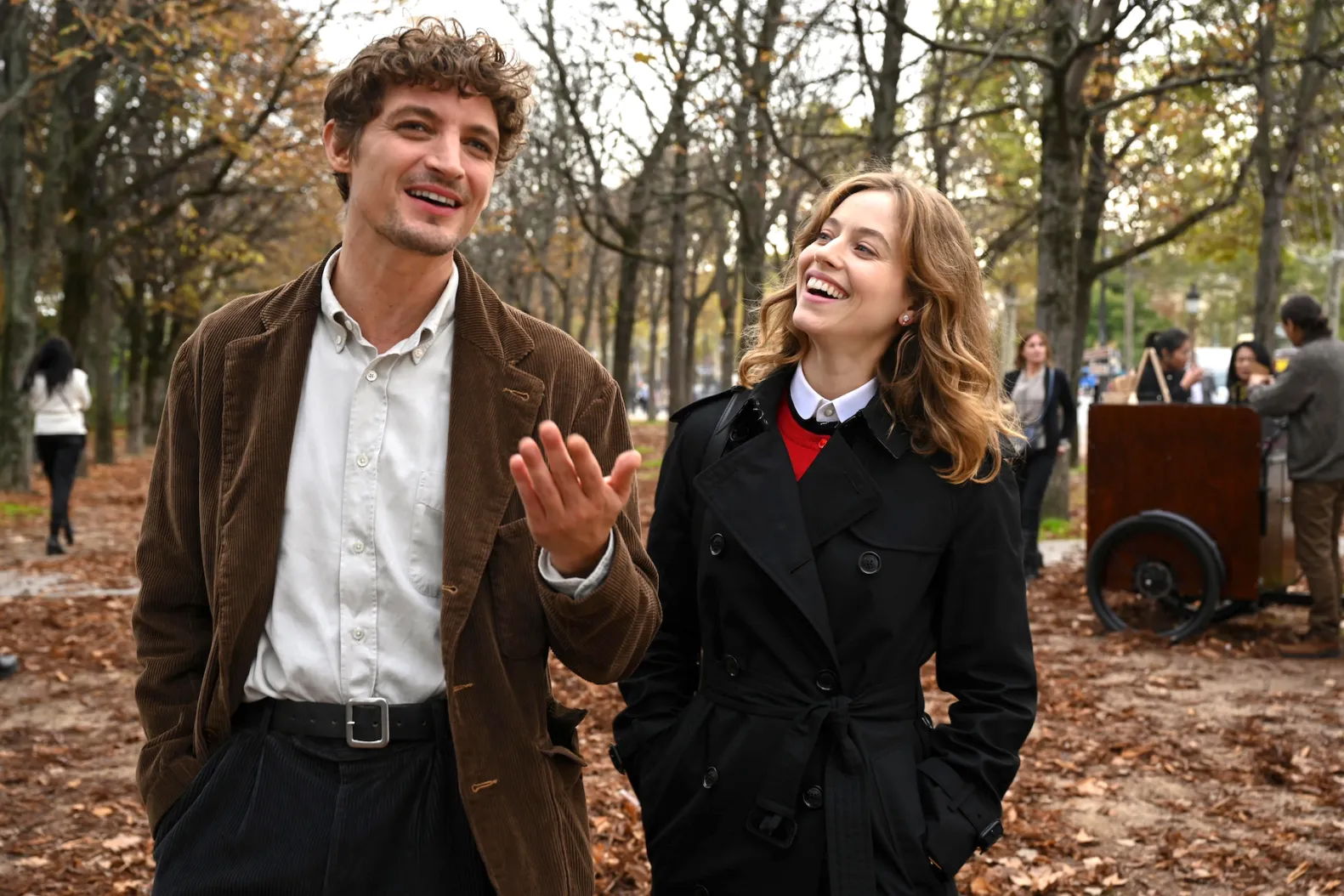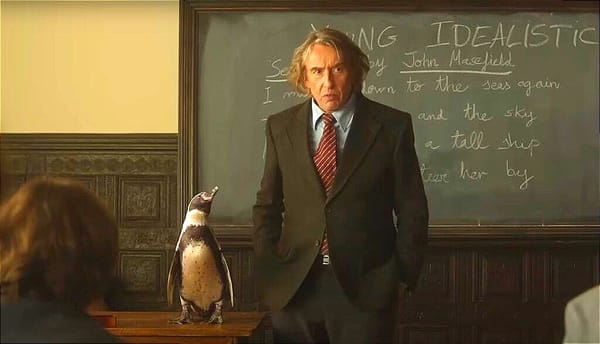What to Watch: Entropy, Anxiety & Woody Allen
Reviews of "Do Not Expect Too Much from the End of the World," "I Saw the TV Glow," "Coup de Chance," "Kingdom of the Planet of the Apes," and "Evil Does Not Exist."

Two reviews of new movies are up at the Washington Post and available for paid subscribers below: “Kingdom of the Planet of the Apes” (⭐ ⭐ ⭐), in which the much-loved series leaps ahead in time and technology, and “Evil Does Not Exist” (⭐ ⭐ ⭐ 1/2), a poetic and profoundly disturbing eco-fable from the great Ryûsuke Hamaguchi (“Drive My Car”).
Some further possibilities for your screening pleasure, at home or in theaters:
“Do Not Expect Too Much from the End of the World” (⭐ ⭐ ⭐ ⭐, streaming on MUBI, for purchase on Amazon, Apple TV, and Fandango at Home) For a movie made out of barbed wire and laughing gas, Radu Jude’s latest is a triumph – a great, shambling comedy of entropy and social collapse. It’s the kind of movie that could only be made by an Eastern European filmmaker (and which Romanian directors have specialized in over the last few decades), ramshackle masterpieces so far gone in their realistic cynicism about the way governments (don’t) work that their impact is somewhere between hilarity and horror. “Do Not Expect” is a post-Godardian ragbag that follows Angela (a majestically foul-mouthed Ilinca Manolache, in photo above) as she drives around Bucharest running errands for an Austrian film company, occasionally pausing to upload TikTok videos in which she cos-plays a parody of a right-wing thug named Bobita.
Jude made one of my favorite films of 2021, “Bad Luck Banging, or Looney Porn,” in which a schoolteacher’s homemade sex tape gets out on the Internet and becomes a litmus test of social hypocrisies. The new film is angrier and therefore funnier, looking out at the wasteland of modern Romania and seeing only corruption, mendacity, misogyny, and exhaustion. In case you think things were better off before, “Do Not Expect” splices in scenes from a 1981 Romanian film, “Angela Moves On,” about a female taxi driver during the height of Nicolae Ceausescu’s dictatorship – nope, they weren’t. The earlier movie’s Angela, played by Dorina Lazar, also turns up as an old lady in Jude’s film, cackling darkly in sisterly solidarity at the uselessness of it all while her husband praises Hungary’s new strongman Victor Orban.

Manolache is every inch the movie’s star: Feisty, thick-skinned, tender-hearted, and given to great arias of profanity when Angela is playing at being Bobita or when she’s crossed by men who essentially are Bobita. Her bosses in Vienna (led by a dead-eyed Nina Hoss as a Faustian descendent of Wilhelm Goethe) treat Angela like a slave while she runs around auditioning disabled factory workers for a video on workplace safety, a process that culminates in a heroic 35-minute single-shot sequence exposing the abyss between bland PR and shabby reality. Along the way, Jude pauses for a stark, silent tour of some of the 600 crosses on a 250-kilometer stretch of local highway – a long, silent elegy for a culture intent on killing itself. “Do Not Expect Too Much from the End of the World” buries its fury and sadness beneath an onslaught of dysfunctional slapstick, but they’re there, embers smoldering and waiting to catch fire.

“I Saw the TV Glow” (⭐ ⭐ 1/2, in theaters) is the second feature from Jane Schoenbrun, who took the festival circuit by storm two years back with “We’re All Going to the World’s Fair,” an unnerving low-budget bedroom-horror tale about a teenage girl whose obsession with a mysterious website starts bending her reality. The new film is an unnerving slightly-higher-budget living room-horror tale about a teenage girl and boy whose obsession with a mysterious TV show starts bending their reality. I think I sense a pattern here.
Distributed by A24, the new movie is receiving rapturous praise from younger critics, and I do wonder if you have to be a Millennial or a Gen Z-er for Schoenbrun's hoodoo to cast its spell. (If you don't know what creepypasta is, consider yourself uninvited.) Which, if so, is fine – put me out on the ice floe with my Ozu DVDs and I’ll go quietly. But while I do think “While the TV Glow” captures that sense of being the only adolescent on the entire planet alive and aware at 2:30 in the morning, it doesn’t do much with it except groove along in low-tempo dread. Plus the ending is a bust. But Brigitte Lundy-Paine is excellent as the latest iteration of the Winona-Christina-Jenna Goth-girl next door, and Schoenbrun has officially got her second movie out of her system. On to fresher things.

Everybody pretty much knows how they feel about Woody Allen by this point, and no one’s going to talk anyone else out of their position, so my saying that “Coup de Chance” (⭐ ⭐ 1/2, available for rent on Amazon, Apple TV, and YouTube) is one of his better recent movies probably won’t change your mind – you’ll either watch it (and maybe sterilize the room afterwards) or you won’t go near the thing. For what it’s worth, Allen has intimated that this, his 50th film, may be his last. Because no one in American will fund his movies anymore and because appearing in a Woody Allen movie no longer carries the cultural cachet it once did for generations of insecure Hollywood actors, the new film is in French and in France, with a bevy of actors familiar mostly to hardcore Franco-cinephiles.
In all other regards, it is of a piece with Woody’s late-life output, a tale of coincidence, chance, and murder that charms at its best and at its worst evaporates upon contact with your eyeballs. Vittorio Storaro's cinematography is an ambered pleasure, Sonia Grande's costumes a tonic to the eyes. The most refreshing improvement over Allen's recent movies is an older female character (Valérie Lemercier as Camille, the amateur-detective mother of the heroine played by Lou de Laâge) who isn’t a psychotic harridan representing the director’s revenge on his former partner Mia Farrow. Indeed, as Richard Brody has pointed out in the New Yorker, Camille feels like a congenial throwback to the kinds of characters Farrow played in Allen’s 1980s output.
For the record, the soundtrack of “Coup de Chance” exchanges the traditional Dixieland for post-bop jazz cuts from Nat Adderley, the MJQ, and Hank Jones. They, too, are an improvement. Two additional side effects: No one sounds like Woody Allen in French and everyone sounds a lot more elegant. But he doubtless already knew that.
My own opinion on Allen, which has been stated in print before, is firmly held yet unintentionally perverse, because it appears to be the exact opposite of what most people believe. The feeling among the general public seems to be that Woody is a great filmmaker who is possibly/probably/definitely not a good man. I feel, on the other hand, that while he may be a horrible human being, I simply don’t have enough information to say I know he is – if you feel you do, by all means speak your piece and leave me out of it – but as a filmmaker he is, and has been for quite some time, grossly overrated.
Needless to say, this is the kind of thing that gets you shot in the aisles at Whole Foods.
Back in 2016, on the occasion of Allen’s “Café Society” being released, I wrote a long essay for the Boston Globe detailing my beefs with the man. The piece is still online, as are the 137 mostly furious comments beneath, but here is some of what I said:
He has directed something like 44 movies, and at least four of them are, in my view, legitimate masterpieces: “Zelig” (1983), “Hannah and Her Sisters” (1986), “Crimes and Misdemeanors” (1989), and “Husbands and Wives” (1992). “Deconstructing Harry” (1997), the closest Allen has ever come to personal confession, is major, too. There’s 1977’s breakthrough “Annie Hall,” of course, but stories of how that movie may or may not have been completely reimagined in the cutting room by editor Ralph Rosenblum after disastrous test screenings muddies its provenance.
Still, that’s six genuine keepers. There are others that are worthy, some that are meh, too many that are just plain bad (did you see “Whatever Works” or “Irrational Man” or “To Rome With Love”?). Allen seems to crank out movies not because he feels artistically compelled but as a reflexive neuro-motor action, like having a trick knee.
And many of those movies are astonishingly uncinematic. On a technical level, his work can be banal or strikingly assured — it usually depends on whether Allen’s working with a great cinematographer like Gordon Willis or Vittorio Storaro (who shot the new film). I give the director complete credit for the breathtaking concept of “Zelig,” a notion worthy of Poe, Kafka, or Borges, but the movie works because of Willis’s visuals, Susan Morse’s editing, and the special effects.
More damaging over the long haul are those scripts in which everybody talks like Woody Allen except for the secondary characters, who are cartoons. (Think of the France-hating parents in “Midnight in Paris” or the two-dimensional working-class lummoxes of “Blue Jasmine.”)
That’s an indication of a much larger failing. Allen seems fundamentally incurious about himself and other people, and the proof of artistic sensibility (in the narrative arts, at least) is an engagement with the human dilemma in all its absurdity and sadness. “Crimes and Misdemeanors” gets there. But aside from “Deconstructing Harry,” there is little self-examination or sustained inquiry in his work.
What seems pretty clear, actually, is that Allen doesn’t like people, period. The old-timey jazz and Windsor font of his title sequences, the neurotic jokes that get a quick laugh and move on, the roteness of the filmmaking, the adoration of women that masks a deeper contempt — all bespeak a bubble of self-absorption and disinterest.
It’s not pretty to say it, but I think Allen’s movies appeal to our own incuriosity. For a lot of diehard fans, even audiences who may not forgive him his perceived off-screen transgressions, he remains a “genius” on little evidence other than nostalgia and a veneer of sophistication — the jazz, the literary and cultural references, the mensch-iness — that makes us feel smart and arty without ever the risk of real challenge. If Woody ever seriously examined himself or his assumptions, then we might have to examine ours, and who wants to pay for that on a Saturday night with popcorn? Better a false sophistication that lets us go home thinking we’ve been culturally elevated than one that draws blood, either his or ours.
You are invited to join the mob throwing brickbats at my bloodied head below.
If you enjoyed this post, please forward it to friends. And if you’re not a paying subscriber and would like to sign up for additional postings and to join the discussions — or just help underwrite this enterprise, for which the author would be eternally grateful — here’s how.





